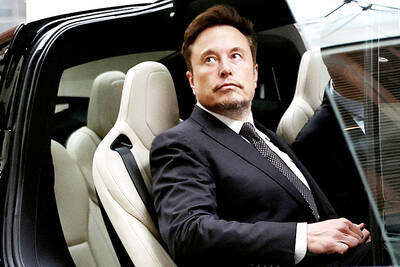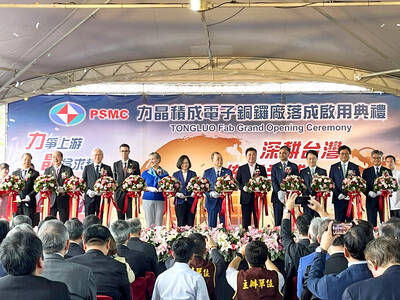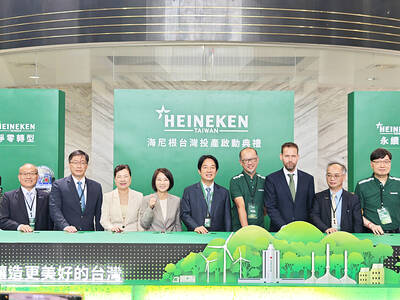A “vast expansion” in US multinational business activity in China since 2000 might threaten US industrial competitiveness and long-term tech leadership, a report released on Wednesday by a congressional US-China advisory commission showed.
The US-China Economic and Security Review Commission warned that rapid moves by US companies away from manufacturing in China and into higher-value activities such as research and development could be “unwittingly enabling China to achieve its industrial policy objectives.”
The commission said its analysis of nearly two decades of US economic and trade data showed a 15-fold increase in US commercial assets in China.
The commission said that US companies employ 1.7 million people in China, an increase of nearly 600 percent since 2000, when US firms employed just 252,000 people there.
MEETING DEMAND
It said that US companies had leveraged China’s cheap labor force, large economies of scale, low transportation costs and concentration of global supply chains, with much of the activity focused on meeting demand from China’s growing consumer class.
US manufacturing in China was mainly focused on production of computers, electronic products and, increasingly, chemicals, but there was also increased investment in research and development, often at the insistence of China.
“These industries ... may indirectly erode the United States’ domestic industrial competitiveness and technological leadership relative to China,” it said, urging the US Congress to take steps to preserve US innovative capacity and leadership.
The report comes amid rising tensions between the US and China, the world’s two largest economies, despite the nations in January signing a “phase one” trade agreement.
US President Donald Trump’s administration has restricted visas and ended exports of defense equipment in response to Beijing imposing national security legislation on Hong Kong.
On Wednesday, it warned US companies about the risks they face from maintaining supply chains associated with human rights abuses in China’s western Xinjiang region.

purpose: Tesla’s CEO sought to meet senior Chinese officials to discuss the rollout of its ‘full self-driving’ software in China and approval to transfer data they had collected Tesla Inc CEO Elon Musk arrived in Beijing yesterday on an unannounced visit, where he is expected to meet senior officials to discuss the rollout of "full self-driving" (FSD) software and permission to transfer data overseas, according to a person with knowledge of the matter. Chinese state media reported that he met Premier Li Qiang (李強) in Beijing, during which Li told Musk that Tesla's development in China could be regarded as a successful example of US-China economic and trade cooperation. Musk confirmed his meeting with the premier yesterday with a post on social media platform X. "Honored to meet with Premier Li

ARTIFICIAL INTELLIGENCE: The chipmaker last month raised its capital spending by 28 percent for this year to NT$32 billion from a previous estimate of NT$25 billion Contract chipmaker Powerchip Semiconductor Manufacturing Corp (力積電子) yesterday launched a new 12-inch fab, tapping into advanced chip-on-wafer-on-substrate (CoWoS) packaging technology to support rising demand for artificial intelligence (AI) devices. Powerchip is to offer interposers, one of three parts in CoWoS packaging technology, with shipments scheduled for the second half of this year, Powerchip chairman Frank Huang (黃崇仁) told reporters on the sidelines of a fab inauguration ceremony in the Tongluo Science Park (銅鑼科學園區) in Miaoli County yesterday. “We are working with customers to supply CoWoS-related business, utilizing part of this new fab’s capacity,” Huang said, adding that Powerchip intended to bridge

Dutch brewing company Heineken NV on Friday announced an investment of NT$13.5 billion (US$414.62 million) over the next five years in Taiwan. The first multinational brewing company to operate in Taiwan, Heineken made the statement at a ceremony held at its brewery in Pingtung County. It also outlined its efforts to make the brewery “net zero” by 2030. Heineken has been in the Taiwanese market for 20 years, Heineken Taiwan managing director Jeff Wu (吳建甫) said. With strong support from local consumers, the Dutch brewery decided to transition from sales to manufacturing in the country, Wu said. Heineken assumed majority ownership and management rights

Microsoft Corp yesterday said that it would create Thailand’s first data center region to boost cloud and artificial intelligence (AI) infrastructure, promising AI training to more than 100,000 people to develop tech. Bangkok is a key economic player in Southeast Asia, but it has lagged behind Indonesia and Singapore when it comes to the tech industry. Thailand has an “incredible opportunity to build a digital-first, AI-powered future,” Microsoft chairman and chief executive officer Satya Nadella said at an event in Bangkok. Data center regions are physical locations that store computing infrastructure, allowing secure and reliable access to cloud platforms. The global embrace of AI